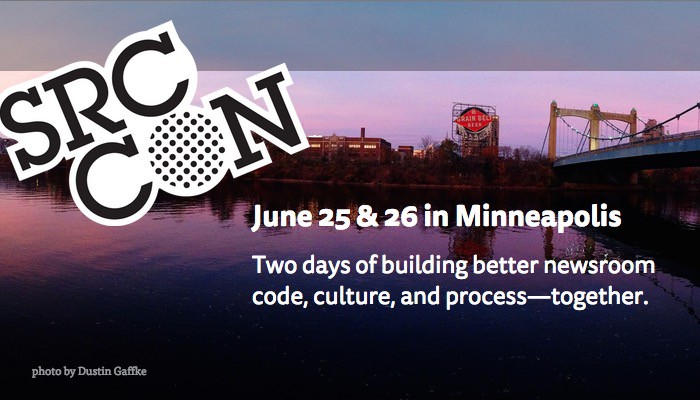
Business casual, bad coffee, dry prewritten speeches, and an 8 a.m. start with no time between sessions — these things are familiar to anyone who’s ever been to a conference. SRCCON (pronounced “Source-Con”), organized by Knight-Mozilla OpenNews and held over two days last week in Minneapolis, aims to avoid the bad conference stereotypes and offer, instead, interactive discussions about “the challenges that news technology and data teams encounter every day.”
There was an NPR-sponsored coffee station run by Manual Coffeemaker No. 1’s Craighton Berman, handcrafting individual cups of pour-over. There was on-site, full-day childcare included in the price of admission. There was local beer, non-alcoholic beer, halal meals for Ramadan, and unisex bathrooms. (There is a flip side to all this inclusiveness: SRCCON’s celebration of nerdery can feel as intimidating at first as the celebration of any other group identity that you don’t totally identify with.) The start time was 10 a.m. the first day and 11 a.m. the second. And with over 50 sessions, the conference’s 220 attendees discussed topics from ad viewability and machine learning to journalist burnout and remote work.
Best toilet signs 💩#srccon pic.twitter.com/jiVLjIzxGL
— Immigrant (@hyper_linda) June 25, 2015
When I say discussed, I really mean discussed. The entire point of SRCCON is to be interactive, and in every session I attended, much or all of the time was spent in conversation with other attendees. Laptops were implicitly discouraged; one of the conference’s suggestions is to be “present,” and people largely were, taking notes with pens and paper or simply listening, with only the occasional tweet.
The result is that if you, like me, are trying to compile a link roundup for this year’s SRCCON, Twitter’s not super-helpful, becaus people staying off their phones made the resulting tweet stream relatively small. (Although it looks big here.) You can see an in-progress Twitter list of attendees here.
Nonetheless, here’s what I’ve compiled. The official session transcripts are here. Here’s the official SRCCON website and our guide from last week on following along with the conference from afar, as well as Quartz’s three daily SRCCON briefs (including a postmortem).
And here are the slides and collective session notes I’ve been able to track down so far — let me know if you have more.
Journalistic objectivity and user-centered design (notes and slides)
Figuring it out: Remote communication (slides)
Why your boss should let you spend time programming bots (notes)
When hiring, you want "culture 'add' not culture 'fit'" Great perspective. #srccon
— Stuart A. Thompson (@stuartathompson) June 25, 2015
A newsroom nadsat: How to build better newsrooms with better language (notes)
Big ambition, small staff, how the f*** do I prioritize? (notes)
Data audioization: How do we bring numbers to life with sound? (notes)
Every part of the pig: How can we make better use of reporting in long investigations? (slides; the moderator of that session, Chris Amico, also posted “a collection of awesome tools for journalism”)
Meeting the New York Times challenge: Delivering the news over HTTPS (notes)
Designing collaborative user research for news organizations (notes)
documentation doesn't have to be painful – *lots* of low hanging fruit. here are a few! #srccon pic.twitter.com/YbVyCMVUQi
— Cathy Deng (@cthydng) June 25, 2015
Brainstorming: The happiest (and most destructive) place on earth (slides)
Data viz for all: Help us make interactives more usable for mobile
Surviving the news business: Self-care and overcoming burnout (notes)
Journo-nerd survey: Help us ask good questions
This post was updated several times.